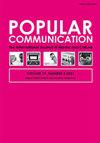Toward a popular theory of algorithms
IF 1.8
Q2 COMMUNICATION
引用次数: 5
Abstract
ABSTRACT This paper establishes dialogs between theories on the popular and critical studies on algorithms and datafication. In doing so, it contributes to reversing the analytical tendency to assume that algorithms have universal effects and that conclusions about “algorithmic power” in the Global North apply unproblematically everywhere else. We begin by clarifying how Latin American scholars and other research traditions have theorized the popular (“lo popular”). We then develop four dimensions of lo popular to implement these ideas in the case of algorithms: playful cultural practices, imagination, resistance, and “in-betweenness.” We argue that this dialogue can generate different ways of thinking about the problems inherent to algorithmic mediation by drawing attention to the remixes of cultural practices, imaginative solutions to everyday problems, “cyborg” forms of resistance, and ambiguous forms of agency that are central to the operations of algorithmic assemblages nowadays.走向一种流行的算法理论
摘要本文在算法和数据化的流行研究和批判性研究的理论之间建立了对话。通过这样做,它有助于扭转分析倾向,即认为算法具有普遍影响,而关于全球北方“算法力量”的结论在其他任何地方都毫无问题地适用。我们首先要澄清拉丁美洲学者和其他研究传统是如何将流行理论化的(“lo popular”)。然后,我们开发了流行的四个维度,以在算法的情况下实现这些想法:有趣的文化实践、想象力、抵抗和“中间性”。我们认为,这种对话可以通过引起人们对文化实践的混合、日常问题的想象力解决方案的关注,产生对算法调解固有问题的不同思考方式,“半机械人”形式的抵抗,以及模糊形式的代理,这些都是当今算法组合操作的核心。
本文章由计算机程序翻译,如有差异,请以英文原文为准。
求助全文
约1分钟内获得全文
求助全文

 求助内容:
求助内容: 应助结果提醒方式:
应助结果提醒方式:


